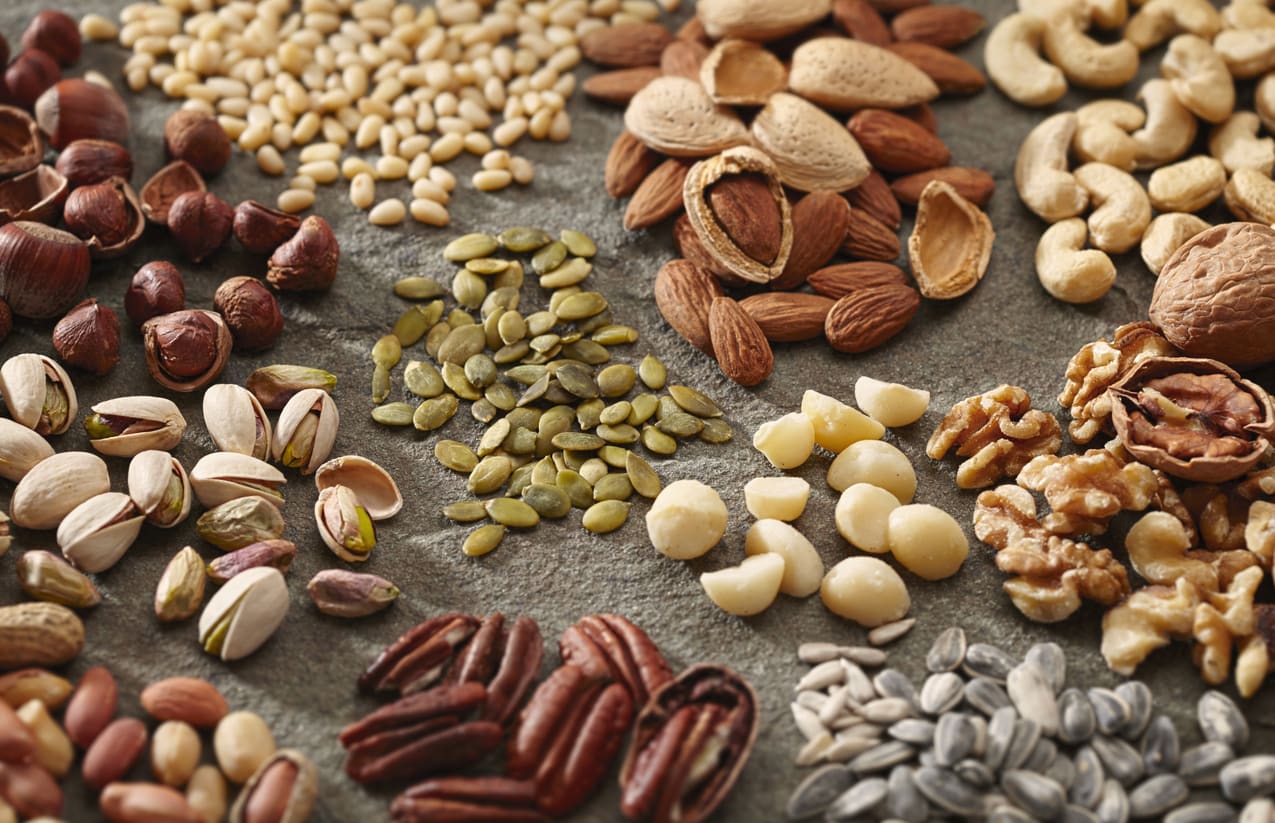There are certain nutrients that are especially beneficial for adults with arthritis. Incorporate the following seven foods into your diet to help ensure you're getting the nutritional balance you need, especially if you are an older adult living with arthritis.
The serving sizes suggested below are recommended by The Arthritis Foundation.

1. Cold-Water Fish
Cold-water fish such as salmon, mackerel, trout, tuna and herring are all rich in Omega 3 Fatty Acids, which have been shown to inhibit inflammation and reduce joint swelling and pain.
- How much? 3-4 ounces, twice a week
- Great for: Rheumatoid arthritis

2. Leafy Green Vegetables
Sulforaphane is an antioxidant found in brussels sprouts, bok choy, cabbage and especially in broccoli. Sulfroaphane and other antioxidants are key in slowing the destruction of joint cartilage and in helping to lower blood pressure.
- How much? 2-3 cups a day
- Great for: Osteoarthritis

3. Calcium
Low-fat dairy products such as milk, yogurt and cheese are packed with calcium and vitamin D, as are orange juice, kale and shellfish. Calcium and vitamin D can both play a role in preserving bone health and lowering blood pressure.
- How much? About 1,000-12,000 mg (or 4 servings) per day
- Great for: Osteoporosis and osteoarthritis

4. Olive Oil
A key compound in extra virgin olive oil is oleocanthal, which can have a significant impact on inflammation (similar to Ibuprofen) and can help reduce joint cartilage damage. Olive oil also contains heart-healthy fats and antioxidants that can reduce inflammation and pain.
- How much? 2-3 tablespoons a day
- Great for: Rheumatoid arthritis and osteoarthritis

5. Whole Grains
Oatmeal, brown and wild rice, beans, peas, lentils, barley and quinoa are excellent sources of whole grains. These foods are linked to lower levels of inflammation and reduced C-reactive protein (CRP) in the blood. CRP is a “marker” of inflammation that is associated with rheumatoid arthritis and other inflammatory diseases.
- How much? 3-5 servings per day
- Great for: Rheumatoid arthritis

6. Nuts
Nuts and seeds are rich in protein, calcium, magnesium, zinc, vitamin E and fiber. These are all nutrients that counter inflammation. In addition, nuts are heart-healthy and beneficial for weight loss. Try walnuts, pine nuts, pistachios and almonds.
- How much? 1.5 ounces per day
- Great for: Osteoarthritis and rheumatoid arthritis

7. Red and Purple Fruits
Anthocyanins are found in many richly colored fruits which and can have an anti-inflammatory effect and reduce the frequency of gout attacks. Fresh cherries and tart cherry juice, strawberries, raspberries, blueberries and blackberries all have similar anti-inflammatory properties.
- How much? 5 ½ cups per day
- Great for: Gout
Drinking tea can also have a healthy impact on your joint health. Green tea is great for the immune system and is especially high in polyphenols, which are antioxidants believed to reduce inflammation and slow the destruction of joint cartilage.
Consider following some of these arthritis-friendly recipes from Sandra Lee that incorporate the healthy foods above.
Foods To Avoid If You Have Arthritis
If you have arthritis, you should not only target the foods above but also limit your intake of:
- Purines — found in meats, particularly beef, pork and lamb
- Sugar — such as fructose and sucrose, found in artificially sweetened foods, soft drinks, desserts and some fruit juices
- Alcohol — especially beer
- Saturated Fats, Trans Fats and Omega 6 Fatty Acids — found in baked goods, fried foods, vegetable oil and margarine
- Refined Carbohydrates — white flour products such as breads, crackers, instant mashed potatoes and french fries
- Gluten — found in any wheat product or products that contain derivatives of wheat
These ingredients and foods are okay in small quantities, but they shouldn’t dominate your diet. Overconsumption of sugar, alcohol, processed foods and unhealthy fats can cause inflammation and usually leads to weight gain, which can lead to or aggravate arthritis symptoms.

Staying Healthy When You Have Arthritis
There are many things that can be done to help preserve your joint function and mobility. Besides incorporating joint-healthy foods into your diet on a regular basis, making time for physical activity and maintaining a healthy weight are essential. If you are experiencing symptoms of arthritis, talk to your primary care physician to help determine what is causing your symptoms. Your physician can teach you more about treatment options and refer you to a specialist if needed.
Medicare beneficiaries with arthritis should note that Medicare Part B offers chronic care management services for those with two or more serious chronic conditions, including arthritis. Other conditions include high blood pressure, diabetes, heart disease and more. Your provider will develop a plan of care to help manage your conditions.
If Medicare Part B covers some of your health care costs, you will still be responsible for meeting deductibles and making coinsurance payments for Medicare-approved services. A Medicare Supplement Insurance plan (also called Medigap) can help cover these out-of-pocket costs.
Learn More
Learn more about how to stay healthy and active as you age by reading these featured articles:
*This content is not medical advice, nor is it a substitute for professional medical advice, diagnosis, or treatment.











